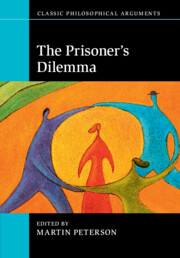Book contents
- Frontmatter
- Contents
- List of contributors
- Introduction
- 1 Why all the fuss? The many aspects of the Prisoner's Dilemma
- 2 How I learned to stop worrying and love the Prisoner's Dilemma
- 3 Taking the Prisoner's Dilemma seriously: what can we learn from a trivial game?
- 4 Prisoner's Dilemma doesn't explain much
- 5 The Prisoner's Dilemma and the coevolution of descriptive and predictive dispositions
- 6 I cannot cheat on you after we talk
- 7 Prisoner's Dilemma cannot be a Newcomb Problem
- 8 Counterfactuals and the Prisoner's Dilemma
- 9 The Tragedy of the Commons as a Voting Game
- 10 The role of numbers in Prisoner's Dilemmas and public good situations
- 11 The inner struggle: why you should cooperate with people you will never meet again
- 12 Prisoner's Dilemmas, intergenerational asymmetry, and climate change ethics
- 13 Prisoner's Dilemma experiments
- 14 The lesson of the Prisoner's Dilemma
- Bibliography
- Index
10 - The role of numbers in Prisoner's Dilemmas and public good situations
Published online by Cambridge University Press: 05 July 2015
- Frontmatter
- Contents
- List of contributors
- Introduction
- 1 Why all the fuss? The many aspects of the Prisoner's Dilemma
- 2 How I learned to stop worrying and love the Prisoner's Dilemma
- 3 Taking the Prisoner's Dilemma seriously: what can we learn from a trivial game?
- 4 Prisoner's Dilemma doesn't explain much
- 5 The Prisoner's Dilemma and the coevolution of descriptive and predictive dispositions
- 6 I cannot cheat on you after we talk
- 7 Prisoner's Dilemma cannot be a Newcomb Problem
- 8 Counterfactuals and the Prisoner's Dilemma
- 9 The Tragedy of the Commons as a Voting Game
- 10 The role of numbers in Prisoner's Dilemmas and public good situations
- 11 The inner struggle: why you should cooperate with people you will never meet again
- 12 Prisoner's Dilemmas, intergenerational asymmetry, and climate change ethics
- 13 Prisoner's Dilemma experiments
- 14 The lesson of the Prisoner's Dilemma
- Bibliography
- Index
Summary
It was a special feature of Musgrave's, Olson's and … Buchanan's work that they stressed the theoretical importance of group size.
(Tuck 2008: 3–4)10.1 Introduction
Although the Prisoner's Dilemma was originally developed and analyzed as a two-person interaction, many of the most important applications of what we might loosely call “Prisoner's Dilemma thinking” involve issues in the social sciences that are concerned with much larger numbers. This fact immediately poses a question: How does the two-person version differ from the large number Prisoner's Dilemma? Do the lessons of (and intuitions arising from) the two-person case carry over to larger scale social applications?
The general consensus in the economics literature is that the differences are very considerable – amounting to something like a qualitative difference between small-number and large-number situations. Consider, for example, the case of market provision of so-called “public goods.” As Richard Tuck observes in the epigraph, virtually all the classic writers on public goods provision make two points: first, that the public goods problem is very like the Prisoner's Dilemma problem in certain critical respects; and second, that small-number cases are unlike large-number cases in that voluntary action is much more likely to secure satisfactory levels of public goods provision in the small-number setting. Buchanan, for example, observes:
the numerous corroborations of the hypothesis in everyday experience are familiar. Volunteer fire departments arise in villages, not in metropolitan centers. Crime rates increase consistently with city size. Africans behave differently in tribal culture than in urban-industrialized settings. There is honor among thieves. The Mafia has its own standards… Litter is more likely to be found on main-traveled routes than on residential streets.
(Buchanan 1965/1999: 322)There is in short consensus that numbers make a difference; but much less consensus concerning exactly how and why they do.
- Type
- Chapter
- Information
- The Prisoner's Dilemma , pp. 177 - 198Publisher: Cambridge University PressPrint publication year: 2015



